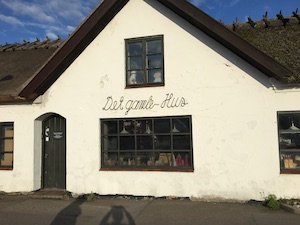Gamesforlanguage: Understanding “gammeln” und “vergammeln”...
 Traveling has the added benefit of opening your eyes to both new and old things.
Traveling has the added benefit of opening your eyes to both new and old things.
Sometimes you even learn to understand words and expressions in your native language that you heard and used - but never thought much about.
That occurred to me recently during our travels through Denmark when I saw “Det gamle Hus” on a house in Gilleleje, Denmark. (see above picture)
In German, you have the words “gammeln” and “vergammeln”. The etymological roots of these words suddenly became clear! And with that, I have an excellent memory crutch for the Danish word.
Das vergammelte Haus?
A quick look at a dictionary clarified that "gammel" means "old" in Danish, and the sign “Det gamle Hus” just means “The old house.” (“Das alte Haus.”)
The German cognate “vergammelt” also means that something is old. In addition “vergammelt” suggests that it's in bad condition, decrepit, run down, etc.
Obviously, if I had looked up the etymology of “gammel”, I would have found an entry such as this:
"Via German Low German from Middle Low German 'gamelen', from Old Saxon (attested in the past participle 'gigamal'). Cognate to Old English 'gamolian'. The verb pertains to an adjective meaning “old” attested in Middle Dutch 'gamel', Old English 'gamol', Old Norse 'gamall' (whence forms in all modern Scandinavian languages)". (Wiki)
The German verb "gammeln"
• third-person singular simple present "gammelt"
• past tense "gammelte",
• past participle "gegammelt", with the auxiliary "haben"
The same Wiki entry lists 2 meanings:
1. Gammeln: to become old; to rot [of food or figurative]
As in: Das Brot von letzter Woche gammelt im Schrank. (Last week’s bread is rotting in the cupboard.)
This Wiki entry also provided a second etymological explanation: "Originally a southern German dialect word. Derived from Middle High German 'gamel', variant of 'gamen' ('amusement'), from Old High German 'gaman'. Related to English 'game'."
2. Gammeln: (informal) to bum around; to do nothing productive; to be idle; to live the life of a hobo
As in: Nach der Schule hab ich zwei Jahre nur gegammelt. (After finishing school I didn't do anything productive for two years.)
“Gammeln” and “vergammeln” may not be words you learn in a German course. But if you ever come across them in Germany (or their cousins in any of the Nordic countries), you now you know their meaning.
As an added benefit for me: I will probably never forget that "old" in Danish is "gammel", and as pointed out above, in all modern Scandinavian languages: Swedish "gammal", Norwegian "gammel", Icelandic "gamall".
So, cognates - such as the Danish “gammel” and the German “gammeln” - are an easy way for learning and remembering vocabulary: You just have to pay attention as you are walking around and try to decipher signs, posters and advertisements.
Bio: Peter Rettig is the co-founder of Gamesforlanguage.com. He is a lifelong language learner, growing up in Austria, Germany, and Switzerland. You can follow him on Facebook, Twitter and Instagram, and leave any comments with contact or below.
